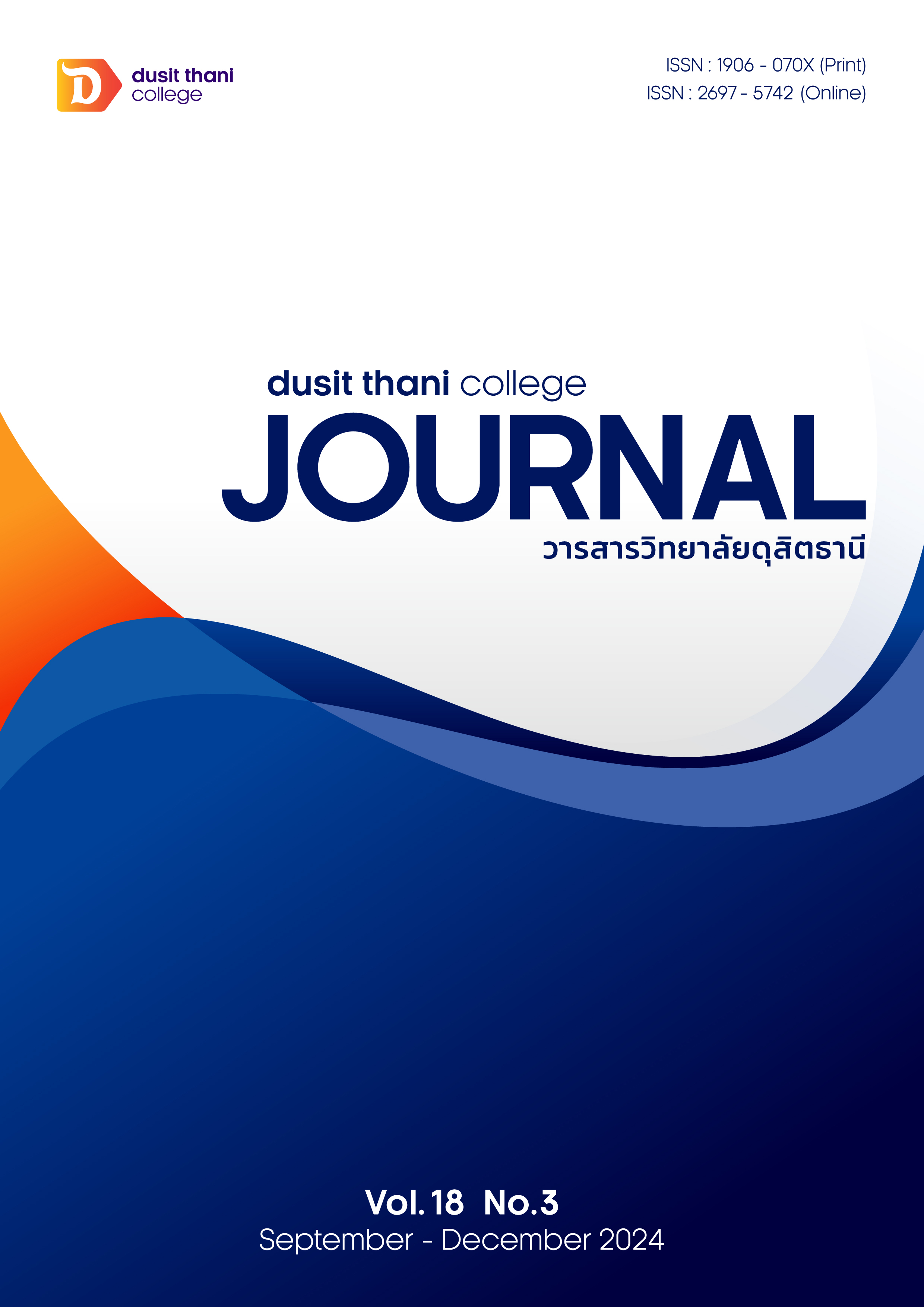ปัจจัยสู่ความสำเร็จในการแข่งขันการประกอบอาหารระดับนานาชาติสำหรับนักเรียนเชฟ ถอดบทเรียนจากการแข่งขัน TCAC 2023
Main Article Content
บทคัดย่อ
การวิจัยนี้มีวัตถุประสงค์ 1) เพื่อวิเคราะห์โครงสร้างและกระบวนการจัดการของการแข่งขัน TCAC 2023 2) เพื่อสรุปบทเรียนจากการวิเคราะห์โครงสร้างและกระบวนการจัดการการแข่งขันระดับเยาวชน และ 3) เพื่อระบุปัจจัยที่ทำให้ผู้เข้าร่วมการแข่งขัน TCAC 2023 ระดับเยาวชนประสบความสำเร็จ การวิจัยนี้เป็นการวิจัยเชิงคุณภาพ
มีการวิเคราะห์เนื้อหา โดยรวบรวมข้อมูลจากเว็บไซต์อย่างเป็นทางการของการแข่งขัน TCAC เอกสารประกอบ ข่าว บทความ และสื่อต่าง ๆ ที่เกี่ยวข้องกับการแข่งขัน การสังเกตแบบมีส่วนร่วมและการสัมภาษณ์ผู้เข้าร่วมการแข่งขันจากวิทยาลัยดุสิตธานีจำนวน 7 คน และทีมผู้ฝึกสอนจำนวน 2 คน เกี่ยวกับความคิดเห็นเรื่องปัจจัยที่ทำให้ผู้แข่งขันประสบความสำเร็จในการแข่งขัน
ผลการวิจัย พบว่า 1) โครงสร้างและกระบวนการจัดการการแข่งขัน TCAC 2023 มีรายละเอียด ดังนี้ คือ (1.1) รูปแบบการแข่งขัน แบ่งเป็น 3 ประเภทหลัก คือ การแข่งขันแบบทีม การแข่งขันแบบเดี่ยว และการแข่งขันแบบผสมผสาน (1.2) โครงสร้างการแข่งขัน ประกอบด้วย รอบคัดเลือก รอบชิงชนะเลิศ และการตัดสิน และ (1.3) กระบวนการจัดการการแข่งขัน ประกอบด้วย การสมัคร การคัดเลือก การเตรียมการ การแข่งขัน และการประกาศผลรางวัล 2) บทเรียนจากการวิเคราะห์การแข่งขัน สรุปได้ ดังนี้ (2.1) ผู้แข่งขันควรเข้าใจโครงสร้างและกระบวนการจัดการของการแข่งขัน (2.2) ผู้แข่งขันควรเตรียมความพร้อมอย่างเหมาะสม (2.3) ผู้แข่งขันควรเข้าใจกฎและกติกาของการแข่งขันโดยละเอียด (2.4) ผู้แข่งขันควรวางแผนและจัดการเวลาได้อย่างมีประสิทธิภาพ (2.5) ผู้แข่งขันควรเตรียมตัวให้พร้อมกับสภาพแวดล้อมการแข่งขัน และ 3) ปัจจัยที่ทำให้การเข้าร่วมการแข่งขันประสบความสำเร็จ ได้แก่ ผู้แข่งขันต้องมีทักษะและคุณสมบัติ “SMART HEART” ดังนี้ S - Sincerity (ความจริงใจ) M - Management
(การจัดการ) A - Adaptability (ความสามารถในการปรับตัว) R - Resilience (ความยืดหยุ่น) T - Teamwork (การทำงานเป็นทีม) H - Humility (ความถ่อมตน) E - Empathy (ความเห็นอกเห็นใจ) A - Accountability (ความรับผิดชอบ) R - Resourcefulness (การใช้ความคิดสร้างสรรค์และทรัพยากรที่มีอยู่อย่างชาญฉลาด) T - Trustworthiness (ความน่าเชื่อถือ) สรุปได้ว่า การเข้าร่วม
การแข่งขันประกอบอาหารในระดับนานาชาติ ช่วยให้นักเรียนเชฟและอาจารย์ได้รับประสบการณ์ที่มีค่า พัฒนาทักษะ เรียนรู้สิ่งใหม่ และสร้างเครือข่าย
Article Details

อนุญาตภายใต้เงื่อนไข Creative Commons Attribution-NonCommercial-NoDerivatives 4.0 International License.
นโยบายการพิจารณากลั่นกรองบทความ
- บทความวิจัยและบทความวิชาการทุกเรื่องที่จะได้รับการตีพิมพ์ต้องผ่านการพิจารณากลั่นกรองโดยผู้ทรงคุณวุฒิ (Peer Review) ในสาขาที่เกี่ยวข้อง จำนวน 3 ท่าน/บทความ
- บทความ ข้อความ ภาพประกอบและตารางประกอบที่ลงตีพิมพ์ในวารสารเป็นความคิดเห็นส่วนตัวของผู้เขียน กองบรรณาธิการไม่จำเป็นต้องเห็นด้วยเสมอไป และไม่มีส่วนรับผิดชอบใด ๆ ถือเป็นความรับผิดชอบของผู้เขียนแต่เพียงผู้เดียว
- บทความที่จะได้รับการตีพิมพ์จะต้องไม่เคยตีพิมพ์ เผยแพร่ที่ใดมาก่อน และไม่อยู่ระหว่างการพิจารณาของวารสารฉบับอื่น หากตรวจสอบพบว่ามีการตีพิมพ์ซ้ำซ้อน ถือเป็นความรับผิดชอบของผู้เขียนแต่เพียงผู้เดียว
- บทความใดที่ผู้อ่านเห็นว่าได้มีการลอกเลียนหรือแอบอ้างโดยปราศจากการอ้างอิง หรือทำให้เข้าใจผิดว่าเป็นผลงานของผู้เขียน กรุณาแจ้งให้กองบรรณาธิการวารสารทราบจะเป็นพระคุณยิ่ง
เอกสารอ้างอิง
Borisova, O. N., Silayeva, A. A., Saburova, L. N., Belokhvostova, N. V., & Sokolova, A. P. (2017). Talent management as an essential element in a corporate personnel development strategy. Academy of strategic management journal, 16, 31.
Bullinger, A. C., Neyer, A. K., Rass, M., & Moeslein, K. M. (2010). Community‐based innovation contests Where competition meets cooperation. Creativity and innovation management, 19(3), 290-303.
Chayanto, N. (2019). Influential Factors in The Competition Success of Thai Professional Boxers in a Standard Boxing Ring in Thailand. Academic Journal of Thailand National Sports University, 11(1), 1-10.
Deci, E. L., & Ryan, R. M. (2000). The" what" and" why" of goal pursuits: Human needs and the self-determination of behavior. Psychological inquiry, 11(4), 227-268.
Griffith, J. A., Baur, J. E., & Buckley, M. R. (2019). Creating comprehensive leadership pipelines: Applying the real options approach to organizational leadership development. Human Resource Management Review, 29(3), 329-342.
Knowles, M. S., Holton III, E. F., & Swanson, R. A. (2014). The adult learner: The definitive classic in adult education and human resource development. Routledge.
Kolb, D. A. (2014). Experiential learning: Experience as the source of learning and development. FT press.
Kuptsch, C., & Pang, E. F. (Eds.). (2006). Competing for global talent. International Labour Organization.
Lenihan, H., McGuirk, H., & Murphy, K. R. (2019). Driving innovation: Public policy and human capital. Research Policy, 48(6), 1447-1461.
Li, C., Huang, J., Wang, J., Yang, J., & Tian, G. (2019, July). Study and Practice on Skills Competition Help Vocational Education Students Growing up. In IOP Conference Series Materials Science and Engineering (Vol. 573, No. 1, p. 012073). IOP Publishing.
Mitsea, E., Drigas, A., & Mantas, P. (2021). Soft Skills & Metacognition as Inclusion Amplifiers in the 21 st Century. International Journal of Online & Biomedical Engineering, 17(4).
Ovanessoff, A., & Purdy, M. (2011). Global chef trends: The rise of international competitions in culinary arts. Journal of Culinary Excellence, 9(3), 45-56.
Piyachokphaisarn, S. & Kasai, P. (2023). Guideline for Human Resource Development of Chef in Restaurant Business. Dusit Thani College Journal, 16 (1), January - April 2022, 149-164.
World Association of Chefs' Societies. (2020). Benefits of participating in culinary competitions. Retrieved from https//worldchefs.org/about-us/
Worldchefs. (2023). 2023 TCAC - Taiwan Culinary Arts Challenge. Retrieved from https//worldchefs.org/event/2023-tcac-aiwan-
tculinary-arts-challenge/
Worldchefs. (2023). Thailand's International Culinary Cup - TICc 2023. https//worldchefs.org/event/thailands-international-culinary
-cup-ticc-2023/.
Yadav, N., Yadav, K., Khare, A., Goel, O., & Goel, P. (2023). Dynamic self-regulation: A key to effective time management. International Journal of Novel Research and Development, 8(11), d854-d876.


